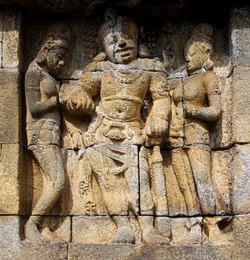Difference between revisions of "Kathā-Vatthu"
m (Text replacement - "Category:Pali terminology" to "{{PaliTerminology}}") |
|||
| Line 1: | Line 1: | ||
[[File:Asura Dvarapala.jpg|thumb|250px|]] | [[File:Asura Dvarapala.jpg|thumb|250px|]] | ||
| − | [[Kathā-Vatthu]]: The fifth of the seven [[Books]] of The [[Abhidhamma Pitaka]]. (Sometimes called the third, e.g., in Mbv.94). It seems to have been compiled when the contents of at least the [[Dhammasanganī]], the [[Vibhanga]] and [[Patthāna]] were already accepted as orthodox. [[Tradition]] ascribes its compilation to [[Moggaliputta-Tissa]] at the end of the Third [[Council]], held under [[Asoka]]'s patronage; at [[Pātaliputta]] (Mhv.v.278; Dpv.vii.41, 56-8). It was rejected by some on the ground that it was set forth two hundred and eighteen years after The [[Buddha]]'s [[Death]], and was hence only a [[Disciple]]'s utterance; but the Commentaries take the [[view]] that the [[mātikā]], the principles taught therein, were laid down by the [[Teacher]] himself, and that the whole work should be regarded as the utterance of The [[Buddha]], just as the [[Madhu-pindika Sutta]], preached really by [[Mahā-Kaccāna]], is considered as The [[Buddha]]'s [[teaching]]. The book consists of twenty-three chapters, and is a collection of discussions ([[kathā]]) and refutations of the heretical [[views]] of various sects on matters connected with {{Wiki|theology}} and [[philosophy]]. The [[Buddha]]'s authority is accepted as final. See the very valuable Preface to the Points of Controversy, by Mrs. Rhys Davids, vii ff See also {{Wiki|Rhys Davids}} on "Questions discussed in the Kathā-Vatthu," J.R.A.S.1892. | + | [[Kathā-Vatthu]]: The fifth of the seven [[Books]] of The [[Abhidhamma Pitaka]]. (Sometimes called the third, e.g., in Mbv.94). It seems to have been compiled when the contents of at least the [[Dhammasanganī]], the [[Vibhanga]] and [[Patthāna]] were already accepted as {{Wiki|orthodox}}. [[Tradition]] ascribes its compilation to [[Moggaliputta-Tissa]] at the end of the Third [[Council]], held under [[Asoka]]'s {{Wiki|patronage}}; at [[Pātaliputta]] (Mhv.v.278; Dpv.vii.41, 56-8). It was rejected by some on the ground that it was set forth two hundred and eighteen years after The [[Buddha]]'s [[Death]], and was hence only a [[Disciple]]'s utterance; but the Commentaries take the [[view]] that the [[mātikā]], the {{Wiki|principles}} [[taught]] therein, were laid down by the [[Teacher]] himself, and that the whole work should be regarded as the utterance of The [[Buddha]], just as the [[Madhu-pindika Sutta]], [[preached]] really by [[Mahā-Kaccāna]], is considered as The [[Buddha]]'s [[teaching]]. The [[book]] consists of twenty-three chapters, and is a collection of discussions ([[kathā]]) and refutations of the {{Wiki|heretical}} [[views]] of various sects on matters connected with {{Wiki|theology}} and [[philosophy]]. The [[Buddha]]'s authority is accepted as final. See the very valuable Preface to the [[Points of Controversy]], by Mrs. {{Wiki|Rhys Davids}}, vii ff See also {{Wiki|Rhys Davids}} on "Questions discussed in the [[Kathā-Vatthu]]," J.R.A.S.1892. |
| − | It has sometimes been suggested (E.g., J.R.A.S.1915, 805ff ) that [[Asoka]]'s Rock Edict IX. has been influenced by the [[Kathā-Vatthu]]. The [[Therī]] [[Khemā]], chief of The [[Buddha]]'s women [[disciples]], describes herself as [[being]] "[[Kathāvatthuvisāradā]]," (ThigA.135) thus strengthening the theory that the Kathā-Vatthu was known already in The [[Buddha]]'s time. | + | It has sometimes been suggested (E.g., J.R.A.S.1915, 805ff ) that [[Asoka]]'s Rock {{Wiki|Edict}} IX. has been influenced by the [[Kathā-Vatthu]]. The [[Therī]] [[Khemā]], chief of The [[Buddha]]'s women [[disciples]], describes herself as [[being]] "[[Kathāvatthuvisāradā]]," (ThigA.135) thus strengthening the {{Wiki|theory}} that the [[Kathā-Vatthu]] was known already in The [[Buddha]]'s [[time]]. |
The [[Udāna]] Commentary (UdA.94) refers to a Kathāvatthupakarana-Tika for details of certain points raised. | The [[Udāna]] Commentary (UdA.94) refers to a Kathāvatthupakarana-Tika for details of certain points raised. | ||
Revision as of 07:33, 30 August 2014
Kathā-Vatthu: The fifth of the seven Books of The Abhidhamma Pitaka. (Sometimes called the third, e.g., in Mbv.94). It seems to have been compiled when the contents of at least the Dhammasanganī, the Vibhanga and Patthāna were already accepted as orthodox. Tradition ascribes its compilation to Moggaliputta-Tissa at the end of the Third Council, held under Asoka's patronage; at Pātaliputta (Mhv.v.278; Dpv.vii.41, 56-8). It was rejected by some on the ground that it was set forth two hundred and eighteen years after The Buddha's Death, and was hence only a Disciple's utterance; but the Commentaries take the view that the mātikā, the principles taught therein, were laid down by the Teacher himself, and that the whole work should be regarded as the utterance of The Buddha, just as the Madhu-pindika Sutta, preached really by Mahā-Kaccāna, is considered as The Buddha's teaching. The book consists of twenty-three chapters, and is a collection of discussions (kathā) and refutations of the heretical views of various sects on matters connected with theology and philosophy. The Buddha's authority is accepted as final. See the very valuable Preface to the Points of Controversy, by Mrs. Rhys Davids, vii ff See also Rhys Davids on "Questions discussed in the Kathā-Vatthu," J.R.A.S.1892.
It has sometimes been suggested (E.g., J.R.A.S.1915, 805ff ) that Asoka's Rock Edict IX. has been influenced by the Kathā-Vatthu. The Therī Khemā, chief of The Buddha's women disciples, describes herself as being "Kathāvatthuvisāradā," (ThigA.135) thus strengthening the theory that the Kathā-Vatthu was known already in The Buddha's time.
The Udāna Commentary (UdA.94) refers to a Kathāvatthupakarana-Tika for details of certain points raised.
